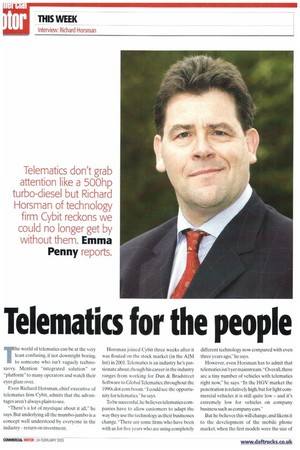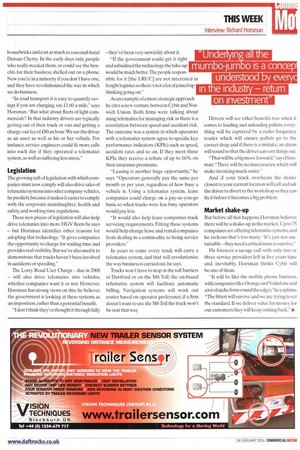Telematics for the people
Page 22

Page 23

If you've noticed an error in this article please click here to report it so we can fix it.
The world of telematics can be at the very least confusing, if not downright boring. to someone who isn't vaguely technosavvy. Mention "integrated solution" or "platform" to many operators and watch their eyes glaze over.
Even Richard Horsman, chief executive of telematics firm Cybit. admits that the advantages aren't always plain to see.
"There's a lot of mystique about it all," he says. But underlying all the mumbo-jumbo is a concept well understood by everyone in the industry — return on investment. Horsman joined Cybit three weeks after it was floated on the stock market (in the AIM fist) in 2001. Telematics is an industry he's passionate about. though his career in the industry ranges from working for Dun & Bradstreet Software to Global Telematics, throughout the 1990s dot corn boom. "I could see the opportunity for telematics," he says.
To be successful, he believes telematics companies have to allow customers to adapt the way they use the technology as their businesses change. "There are some firms who have been with us for five years who are using completely different technology now compared with even three years ago," he says.
However, even Horsman has to admit that telematics isn't yet mainstream. "Overall, there are a tiny number of vehicles with telematics right now," he says. "In the HGV market the penetration is relatively high.but for light commercial vehicles it is still quite low — and it's extremely low for vehicles on company business such as company cars.
But he believes this will change, and likens it to the development of the mobile phone market, when the first models were the size of housebricks and cost as much as a second-hand Datsun Cherry. In the early days only people who really needed them, or could see the benefits for their business, shelled out on a phone. Now you're in a minority if you don't have one, and they have revolutionised the way in which we do business.
"In road transport it is easy to quantify savings if you are charging, say £1.60 a mile," says Horsman. -But what about fleets of light commercials? In that industry drivers are typically getting out of their truck or van and getting a charge-out fee of £80 an hour.We see the driver as an asset as well as his or her vehicle. For instance. service engineers could fit more calls into each day if they operated a telematics system, as well as suffering less stress."
Legislation
The growing raft of legislation with which companies must now comply will also drive sales of telematics systems into other company vehicles, he predicts,because it makes it easier to comply with the corporate manslaughter, health and safety, and working time regulations.
These new pieces of legislation will also help drive telematics into more HGV fleets he says — but Horsman identifies other reasons for adopting this technology. "It gives companies the opportunity to charge for waiting time and provides real visibility. But we've also used it to demonstrate that trucks haven't been involved in accidents or speeding."
The Lorry Road User Charge — due in 2008 — will also drive telematics into vehicles, whether companies want it or not. However, Horsman has strong views on this; he believes the government is looking at these systems as an imposition, rather than a potential benefit.
"I don't think they've thought it through fully — they've been very unwieldy about it.
"If the government could get it right and subsidised the technology the take-up would be much better.The people responsible for it [the LRUC] are not interested in freight logistics so there's not a lot ofjoined up thinking going on."
As an example of a more strategic approach he cites a new venture between Cybit and Norwich Union. Both firms were talking about using telematics for managing risk as there is a correlation between speed and accident risk. The outcome was a system in which operators with a telematics system agree to specific key performance indicators (KPIs) such as speed, accident rates and so on. If they meet these KPIs, they receive a rebate of up to 16% on their insurance premiums.
"Leasing is another huge opportunity," he says. "Operators generally pay the same per month or per year, regardless of how busy a vehicle is. Using a telematics system, lease companies could charge on a pay-as-you-go basis, so when trucks were less busy operators would pay less.
"It would also help lease companies track servicing requirements. Fitting these systems would help change lease and rental companies from dealing in a commodity to being service providers."
In years to come every truck will carry a telematics system, and that will revolutionise the way business is carried out,he says.
Trucks won't have to stop at the toll barriers at Dartford or on the M6 Toll; the on-board telematics system will facilitate automatic billing. Navigation systems will work out routes based on operator preference; if a firm doesn't want to use the M6 Toll the truck won't be sent that way. Drivers will see other benefits too: when it comes to loading and unloading pallets, everything will be captured by a radio frequency reader which will ensure pallets go to the correct drop, and if there is a mistake, an alarm will sound so that the driver can sort things out.
"That will be a big move forward.says Horsman. "There will be no inaccuracies, which will make invoicing much easier."
And if your truck overheats the dealer closest to yourcurrent location will call and ask the driver to divert to the workshop so they can fix it before it becomes a big problem.
Market shake-up
But before all that happens, Horsman believes there will be a shake-up in the market. Up to 75 companies are offering telematics systems, and he reckons that's too many. "It's just not sustainable— they need a critical mass to survive."
He foresees a savage cull with only two or three service providers left in five years time and, inevitably, Horsman thinks Cybit will be one of them.
"It will be like the mobile phone business, with companies like Orange and Vodafone and a lot of niche firms round the edges," he explains. "The fittest will survive and we are trying to set the standard.!f we deliver value for money for our customers they will keep coming back." •










































































































































































































